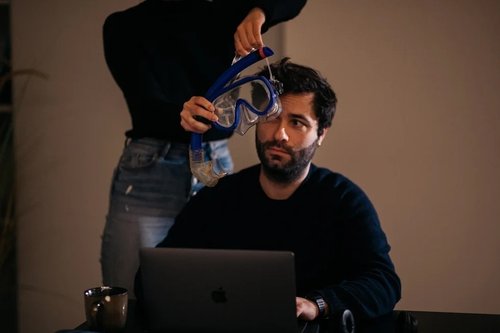Austria: ‘I’ve (finally) found a fulfilling work environment’
Oct 20, 2021
5 mins

AG
Auteure et scénariste freelance
Austria is well known for its stunning landscape and tasty schnitzel but less so for its professional practices. There are lots to be learned from this country at the heart of Europe, however. The Covid crisis has changed working habits around the world and many employees have called for some changes to be made permanent. So what inspiration can we take from this Alpine country? How about truly flat management and companies that trust their employees? Here are a few takeaways from my professional experience.
“Willkommen in Wien,” which means “welcome to Vienna”, are the words that launched my nearly eight-year professional adventure in Austria. When I was 24 years old, I was hired to work as a project officer in an R&D department there. What I didn’t know at the time was that I was going to discover a world that was vastly different from the one I’d experienced at home in France.
Horizontal hierarchy or when the new girl can meet a minister
First culture shock: the (truly) flat hierarchy For a French woman who’s hard-wired to be cold and formal, saying “Hey Hans, what’s up?” to the big boss is an interesting experience. My professional future, and that of some 200 others, was in his hands. But these casual exchanges aren’t just about semantics what’s the point of being informal with a superior if they don’t acknowledge my skills?
While working in Austria, I saw horizontal management for myself in the way employees were listened to and given credit for their ideas, no matter their level of experience. I remember being in Hans’s office one time with another coworker while we explained that, in our opinion, there was a lack of clear communication between the different teams within the company. To fix this, we wanted to create a series of internal seminars called Science and Technology for Dummies, borrowing the name from famous books with yellow covers. We would use humor to get colleagues to take part and talk to each other about their work. The boss said yes. We decided to have fun with it. So my coworker and I walked around dressed in yellow books to announce the launch of our event. It looked silly, but the content was solid, and, for six months, the weekly meetings we offered were a success.
This flat management structure also shows the fact that the best opportunities are offered not only to managers but to everyone. I hadn’t even been at the company for six months when I was surprised to learn that I was to meet the Austrian Minister of the Interior and be the sole representative of my employer at a European working group. Dave, a French friend working for another company in Vienna, told me he had been entrusted with managing a project with a budget of €200,000 shortly after he got there. He was expected to deliver results, but it was the outcome that mattered, not the process.
That’s one of the things I liked most about flat management: the boss tells you what to do, but not how to do it. They have the final say, but it seems to be a given that people are hired for their skills and will know best how to get the job done. I felt that autonomy, creativity, and talent were what mattered most.
You define your career path, it’s not defined for you
Second culture shock: the relationship with education. In France, it felt like I had been put into a box right after secondary school and that I was expected to stay in that box until I retired. I was blown away by the Austrian view of education and qualifications.
People get jobs that may not have a lot to do with what they studied: a friend who had done languages ended up as a marketing manager; I had a law degree and I was managing an R&D project. The concept of an “Ivy League school” doesn’t exist, and a degree can help you to get a job in any kind of company and to advance your career. You are not labeled based on what topic you took or how prestigious your college was. It’s what you learned while in school and how you put it into practice that matters.
The professional and student worlds aren’t as separate as they are in France. Young people can work for up to 20 hours per week, while continuing to study. That way they can test out a post, work in a team and refine their professional choices when still in college. When I was there, eight of my friends were students –– and five of them were already working in a company.
It works the other way around too: an employee can easily go back to school, without being ostracized for doing so. Dave told me the story of an HR manager who was working part-time so that they could study and then move into forestry development. She was still given plenty of high-level responsibilities within her company.
Continuing education is a strategic concern for Austria: in 2018, it invested €190 million in the sector, when social security contributions to students are included. Between 2009 and 2018, the number of Austrians who received a scholarship to study went up by 34%. On top of that, you can take time off specifically to study. It’s called Bildungskarenz or educational leave and an employee can take from two to 12 months every four years. So education is an integral part of the Austrian professional world. The prospect of being able to study and still advance your career throughout your life is a truly positive aspect of life in Austria in my view.
In charge of your own schedule
Third culture shock: managing your own time. My expat friends and I, who worked in different companies, noticed the same thing: we could start and end our days at a time that suited us, so long as we did no more than the legal 38.5 hours a week. We also had Friday afternoons off. Long before the pandemic happened, working remotely was already part of the culture.
Presenteeism doesn’t exist either. You are expected to take time off when you need it. So going to work with a runny nose is frowned upon. I still remember seeing my manager’s half-accusatory, half-pitying look on several occasions when I sneezed. If you’re sick, it’s better to stay home rather than infect your colleagues all for the sake of finishing a project. You’re trusted to gauge how unwell you are yourself and you can take up to two days off without a doctor’s note. You’re responsible for yourself.
This flexibility and willingness to empower employees seem to be having a positive effect. Austrian productivity is 10 points higher than the EU average, according to a report from the Chamber of Labour (Arbeiterkammer), an organization that represents the interests of Austrian employees and consumers.
Beyond just managing your own time, part-time (teilzeit) work is very popular in Austria, and it’s not just for students. Going part-time is easy to do and you won’t be judged harshly. When I was 28, I switched to a 90% work contract, simply because I wanted to have more free time. Seniors nearing retirement or young parents can benefit from work contracts of four, 10, or 20 hours a week. A total of 27.9% of Austrian employees were on teilzeit in 2020. The Austrian Chamber of Commerce (WKO) encourages part-time work to promote employee wellbeing.
Trust in the individual
In the end, the feeling I got from working in Austria was one of empowerment, of being truly trusted. The idea that the individual naturally do what’s best for the common good is part of the culture there. Trying to explain that the Parisian métro has turnstiles to keep people from defrauding the system will get you a wide-eyed stare from an Austrian!
Are Austrians aware of how good they have it? Maybe. In any case, plenty of expats have pointed this out! After all, Austria seems to have everything it takes to make employees feel motivated and fulfilled at work.
Translated by: Kalin Linsberg
Photo: Welcome to the Jungle
Follow Welcome to the Jungle on Facebook, LinkedIn, and Instagram, and subscribe to our newsletter to get our latest articles every day!

More inspiration: International

Germany trials the four-day workweek: “Free time is invaluable”
Germany's four-day workweek trial may be the solution to greater productivity, worker satisfaction, and work-life balance.
Jun 10, 2024

The Fuckup Nights movement: The art of sharing failures on stage
Discover the global movement fostering learning, community, and authenticity with Fuckup Nights co-founder Pepe Villatoro.
May 23, 2024

Why is Europe so eager to attract foreign workers?
Looking for work abroad? Now might be your chance. The European Union is facing labor shortages, prompting efforts to attract foreign workers.
May 22, 2024

What if working less isn't the answer?
For sociologist and researcher Julia Posca, "It's not just about working less, it’s mainly about working better."
Apr 10, 2024

Hangover leave? Pawternity PTO? Explore the world’s quirkiest paid leave initiatives
Need time off for your birthday, a breakup or simply a lack of motivation? In some countries, it's possible.
Apr 04, 2024
The newsletter that does the job
Want to keep up with the latest articles? Twice a week you can receive stories, jobs, and tips in your inbox.

Looking for your next job?
Over 200,000 people have found a job with Welcome to the Jungle.
Explore jobs